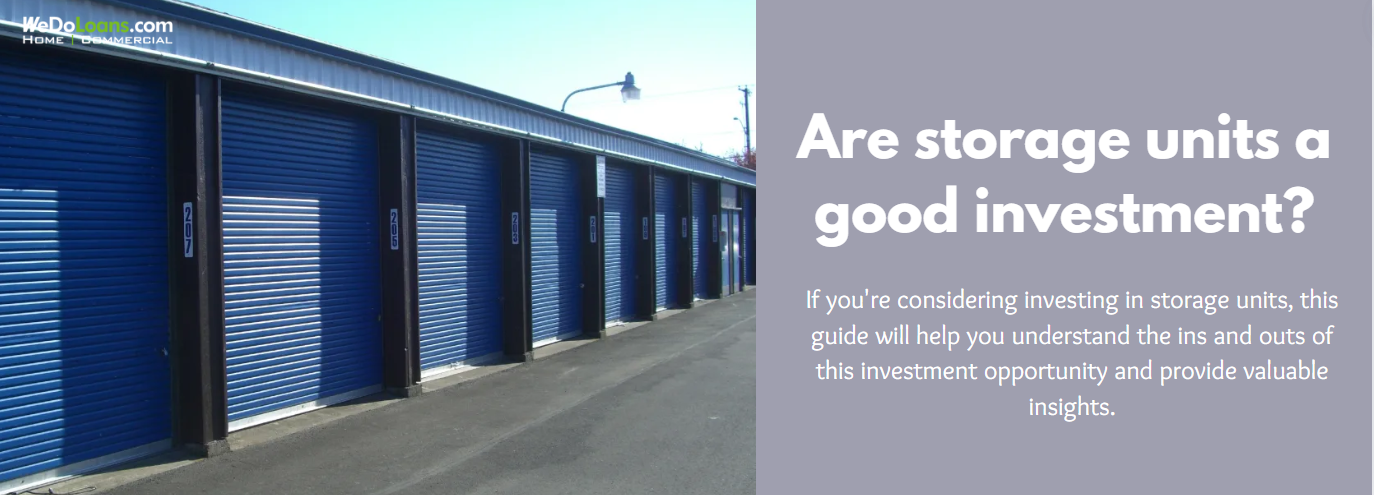
Investing in self-storage can be advantageous for certain investors. With numerous opportunities in various locations, it’s worth considering this investment to gauge its potential profitability.
What is Self-Storage?
Self-storage involves renting out secure spaces where individuals can store items they don’t have room for at home. These facilities typically consist of multiple compartments or units that are secure and accessible to renters.
Self-storage caters to the unique needs of clients. Some facilities offer drive-up access with garage-style doors, while others provide indoor, climate-controlled units.
What is Self-Storage Used For?
Self-storage units are versatile and can be used for a wide range of purposes, depending on the facility’s restrictions. Common uses include:
- Personal storage: People use storage units to store personal belongings during moves or for long-term storage of items they can’t keep at home.
- Business storage: Businesses often use storage facilities for inventory, equipment, and other assets, either temporarily or for extended periods.
- Vehicle storage: Some units are used for storing vehicles, such as cars, boats, or RVs, that can’t be kept on residential or business properties.
Why Should You Invest in Storage Units?
Self-storage presents a potentially lucrative opportunity for investors looking to diversify their portfolios. Several factors make this investment appealing:
- Growing industry: The self-storage industry generates approximately $39 billion annually in the U.S., with around 10% of American households using storage units.
- Low maintenance: Self-storage facilities typically have low upkeep costs, as they don’t require extensive staffing, mechanical upgrades, or complex marketing efforts.
- High profit margins: With relatively low development and operating costs, storage units often yield high profit margins, sometimes around 41%.
- Minimal construction needs: Storage facilities are less expensive to develop than residential or commercial properties, as they don’t require the amenities needed for living spaces.
How Profitable are Self-Storage Units?
The profitability of self-storage units depends on factors like location, size, and demand. For some businesses, self-storage can generate annual revenue ranging from $350,000 to $800,000. With consistent rental income and low operational costs, storage units can be highly profitable in areas with limited competition.
Should You Invest in a New or Existing Storage Facility?
Key reasons to consider investing in storage units include:
- Low maintenance: These facilities require minimal upkeep compared to residential properties, particularly if they’re newer and well-constructed.
- Limited risks: Storage facilities typically experience lower foot traffic, reducing risks associated with property management.
- Affordable land: Storage units can be built on less desirable land, making the initial investment more affordable.
- Higher profit margins: The high-profit margin and low break-even point make self-storage an attractive investment.
However, there are some drawbacks:
- Market saturation: In some areas, the market may be oversaturated, leading to reduced demand.
- Eviction challenges: If a renter stops making payments, the owner must manage the eviction process and dispose of the stored belongings, which can be complicated.
- Marketing challenges: Economic downturns can impact the demand for storage units, making advertising more difficult.
- Insurance requirements: Property owners must maintain insurance to cover building and liability risks.
How to Invest in Storage Units: What to Look For?
When investing in storage units, consider the following factors:
- Location: Choose a facility with good accessibility, visibility, and low competition in a growing area.
- Demand and supply analysis: Ensure there’s a demand for self-storage in the area.
- Zoning and regulations: Verify that the property is zoned for self-storage and complies with local regulations.
- Physical condition: Inspect the property and budget for maintenance.
- Design and layout: Offer a variety of unit sizes with security features and amenities that attract customers.
- Financial analysis: Calculate revenue projections, expenses, and return on investment.
- Legal considerations: Ensure lease agreements are legally sound and comply with regulations.
- Environmental considerations: Assess potential environmental risks.
- Management: Decide whether to manage the property yourself or hire a management company.
- Reputation and branding: Consider how you’ll market the facility and build its reputation.
Financing Options for Self-Storage Units
Investors can finance self-storage businesses through various means, including SBA loans, traditional bank loans, and credit union financing.
Conclusion
Self-storage is a growing investment opportunity with a low initial cost, minimal management, and high demand in many areas. Although some markets may be saturated, newer, secure facilities continue to attract customers. With available financing and low entry barriers, storage units can be a valuable addition to an investment portfolio.
